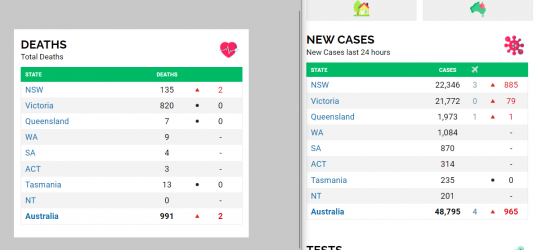pagingjoan
Established Member
- Joined
- Mar 30, 2009
- Posts
- 2,177
The Vic Gov website specifies that, during the current lockdown, “authorised providers” in dental services covers only:For Victoria, I don't know whether the DHHS essential worker list applies at the moment and whether there are any other versions in existence, but a version I read said dentists could only conduct dental services to treat facial swelling, facial trauma and severe unrelenting pain.
A Victorian dental association says:
Dental restrictions in metropolitan Melbourne
The lockdown for metropolitan Melbourne was extended until midnight Thursday 2 September 2021.
A curfew operates from 9pm to 5am every night. Permits will be required to leave the house for authorised work, consistent with the arrangements that were in place last year. Authorised workers will be required to carry permits when working and when travelling for work from 11:59pm Tuesday 17 August. The permit needs to be certified by an employer. Permits are available from the coronavirus website.
Dental practitioners in metropolitan Melbourne are still only permitted to provide dental services for the management of patients with urgent needs or care where failure to do so in a clinically appropriate timeframe will lead to adverse outcomes. These restrictions are part of the Restricted Activity Directions issued by the Victorian Government under the authority of the Public Health and Wellbeing Act 2008 (Vic) and are legally binding. Penalties apply for failure to comply with these restrictions.
Restrictions on dental services are designed to balance the need to access necessary dental care with the reduction of movement of people in the community. This should guide clinical decision making. Clinicians should take a risk-based approach during this period. There is more information here to provide guidance. The ADAVB won’t provide specific advice on what treatment can or cannot be provided – dentists must exercise their clinical judgement to determine whether a delay in care will lead to adverse outcomes.
For NSW, the authorised worker list is vague on dental. Dental is not specifically mentioned in the list. Only healthcare and social services is the closest relevant broad category. You need a lawyer or industry association to find out if dental is a health or medical service as defined by a specific State legislation that more generally applies to public hospitals. While the authorised worker list only applies to residents of LGAs of concern, a person could only safely said everything in that industry is open if the authorised worker list applied to that category.
Interestingly, a NSW dental association says (their bolding):
Updated advice from the Dental Council of NSW
As of Thursday 12 August, the Dental Council of NSW released advice for all dental practitioners in NSW regarding the regulatory requirements for limiting dental practise during this current outbreak.
In accordance with this advice, all NSW dental practitioners should take a risk-based approach to deferring dental care with a view to reducing movement of people in the community. During this time, dental practitioners must exercise their clinical judgement to determine whether a delay in dental care would lead to adverse patient outcomes.
All dental practitioners across NSW at the moment are limited to the provision of either essential or urgent/emergency dental care only. The reason for this dental care should be clearly documented in the patient record.
Practitioners outside the 12 LGAs of concern in NSW are limited to the provision of essential dental care.
Practitioners within the 12 LGAs of concern in Greater Sydney are limited to the provision of urgent/emergency dental care only.
*The 12 LGAs of concern include Bayside, Blacktown, Burwood, Campbelltown, Canterbury-Bankstown, coughberland, Fairfield, Georges River, Liverpool, Parramatta, Strathfield, and 12 suburbs of Penrith.
“dental services undertaken by oral health professionals in the management of patients with urgent needs or care where failure to do so in a clinically appropriate timeframe will lead to adverse outcomes“.
















